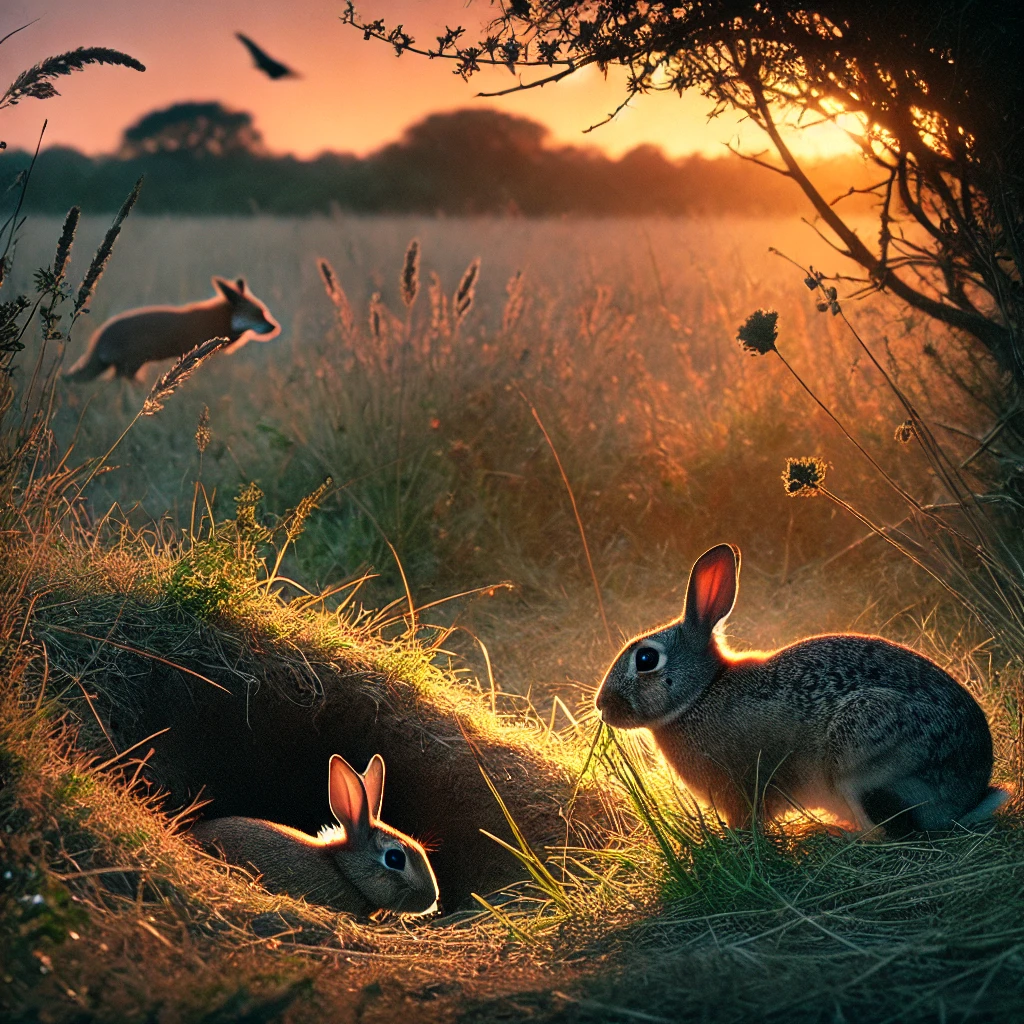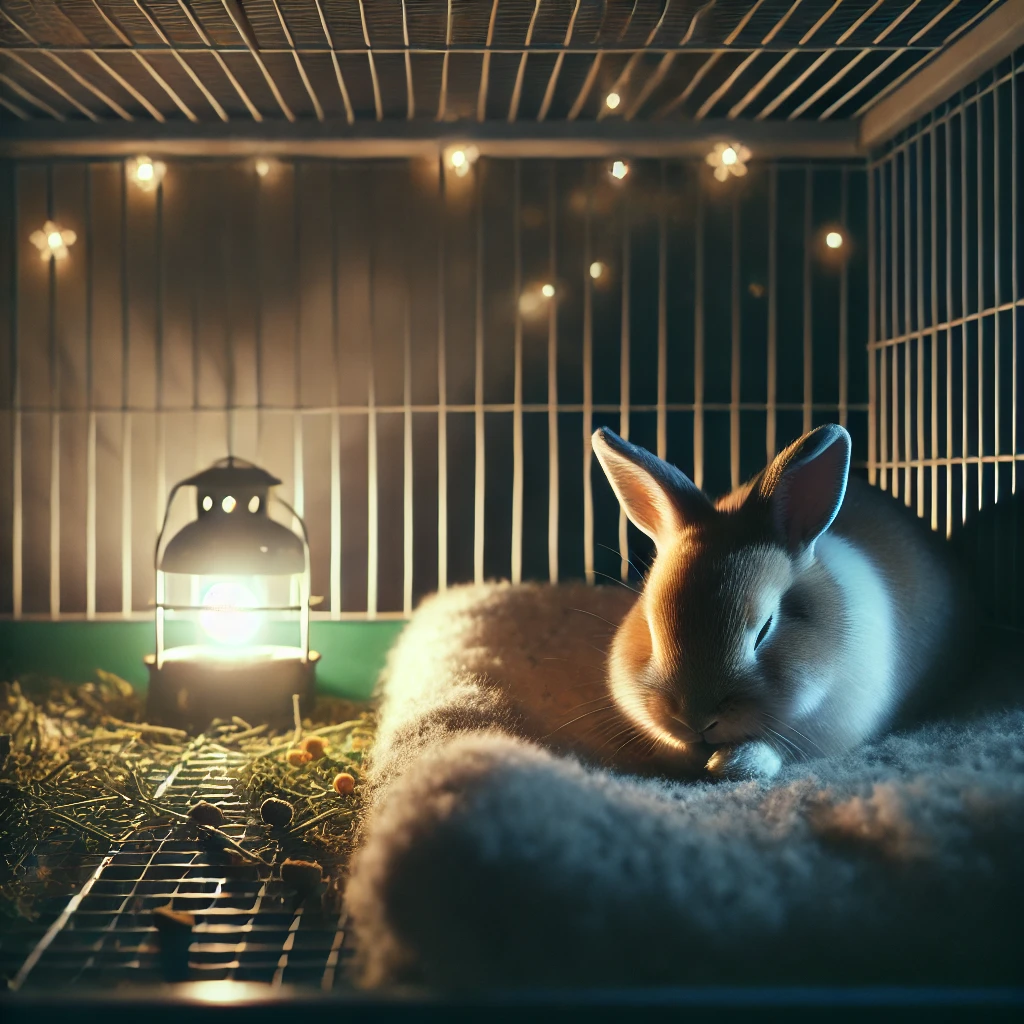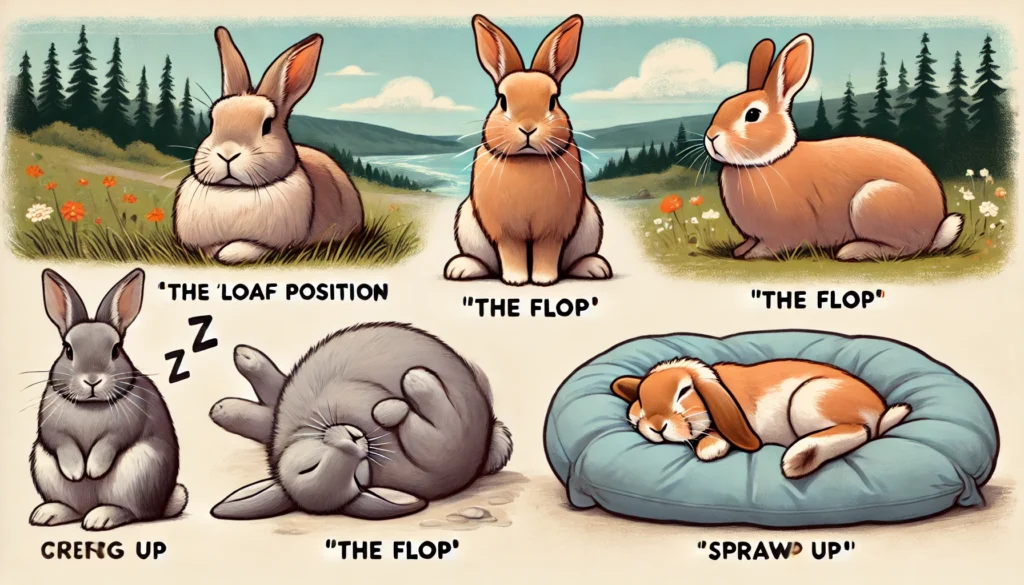The Answer: Rabbits Are Not Nocturnal!

What Does “Nocturnal” Mean?
To understand if rabbits are nocturnal, let’s first explain what that word means. Nocturnal animals are those that are awake and active during the night. Examples of nocturnal animals include owls, bats, and raccoons. These animals typically sleep during the day and come out when it’s dark to find food, play, or hunt.
Why Are Rabbits Crepuscular?
Being crepuscular helps rabbits survive in the wild. Since they are small and often prey on larger animals, they need to be smart about when they are active. Dawn and dusk offer the best balance of light, making it harder for predators like hawks, foxes, and owls to spot them.
In the wild, rabbits stay hidden in their burrows or under bushes during the hottest part of the day and the darkest part of the night. This minimizes their chances of being caught by predators that hunt during the day or at night. By being crepuscular, rabbits can search for food while staying out of sight from most threats.
What Do Rabbits Do During the Day?
During the day, rabbits usually rest and nap. If you have a pet rabbit, you might notice it lying down for long periods in a quiet, cozy spot. Rabbits are excellent at finding peaceful areas to relax where they feel safe. They typically sleep with their eyes half-open to stay alert to any sudden movements or sounds that could signal danger.
Even though they are resting during the day, they aren’t completely out of energy. Rabbits are known for taking short naps rather than sleeping deeply for hours like humans. This helps them stay alert and ready to hop away if something scares them.
What Do Rabbits Do at Night?
At night, rabbits usually sleep but may wake up occasionally to snack or quietly hop around. Since they are crepuscular, not nocturnal, they aren’t awake all night like true nocturnal animals. If you’re wondering, are rabbits nocturnal animals, the answer is no—they are most active during the early morning and evening. If you have a pet rabbit, you might notice them moving around their cage or nibbling on food during the night. Rabbits are light sleepers and often wake up briefly to eat before settling back down to rest.
Fun Facts About Rabbit Sleeping Habits
- Eyes Wide Open: Rabbits can sleep with their eyes open! This might sound strange, but it helps them stay alert to danger even while resting. When their eyes are open, any sudden movement or change in light can quickly wake them up.
- Daytime Nappers: Rabbits take many short naps throughout the day. Instead of sleeping for long hours like humans, they prefer to doze off in short bursts. These mini-naps help them stay refreshed and ready to escape if they sense a threat.
- Sneaky and Silent: Even though they sleep during the day and night, rabbits are incredibly quiet. Their movements are soft and almost soundless, which helps them stay hidden from predators. If you own a rabbit, you might not even notice them hopping around!
Rabbit Sleeping Positions
Rabbits have several sleeping positions, each giving clues about how comfortable and safe they feel. If you’ve ever watched a rabbit sleep, you might have noticed these different positions:
- Loaf Position: In this position, the rabbit tucks its feet under its body and sits upright, looking like a little loaf of bread. This is a common position for resting because it allows the rabbit to stay alert while still relaxing. Their ears are often pointed up, ready to catch any noise.
- The Flop: When a rabbit flops over on its side, it’s a sign that they feel safe and completely relaxed. This position shows that the rabbit trusts its environment because they’re lying on their side, making it harder to hop up quickly if something dangerous appears.
- Sprawled Out: A rabbit that stretches its legs out behind it while lying down is comfortable and relaxed. This position often happens when a rabbit is enjoying some downtime, and you might notice them doing it after a nice meal or a playful session.
- Curled Up: Some rabbits curl up into a tight ball when they sleep, tucking their head under their body. This position helps them stay warm and makes them feel protected.
What If You Have a Pet Rabbit?
If you have a pet rabbit, you’ve probably noticed that it’s most playful early in the morning and late in the evening. These are the best times to interact with your bunny; they’ll be full of energy, hopping around, playing, and munching on their food.
You’ll likely see your rabbit resting or lying down during the middle of the day. It’s important to make sure your pet rabbit has a quiet and cozy place to sleep, just like they would have in the wild. A space where they feel safe and hidden will help them relax and enjoy their naps.
Also, keep in mind that rabbits need plenty of space to move around, especially during their active hours. Whether they are in a cage or allowed to roam free in a room, ensure they have enough room to stretch their legs and hop around.
Conclusion
So, are rabbits nocturnal?
FAQs
- Are rabbits active at night?
Rabbits are not very active at night; they are crepuscular, meaning they are most active at dawn and dusk. - Where do wild rabbits sleep at night?
Wild rabbits sleep in burrows or hidden spots like dense bushes or tall grass to stay safe from predators. - What time of day are rabbits most active?
Rabbits are most active during the early morning (dawn) and late evening (dusk). - Do rabbits come out to eat at night?
Rabbits may wake up briefly to eat at night, but they are not primarily active during this time. - What smell do rabbits hate?
Rabbits dislike strong smells like vinegar, garlic, and predator scents like fox urine.




Leave a Reply